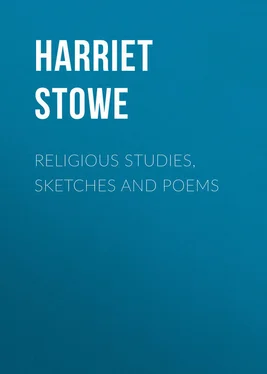Harriet Stowe - Religious Studies, Sketches and Poems
Здесь есть возможность читать онлайн «Harriet Stowe - Religious Studies, Sketches and Poems» — ознакомительный отрывок электронной книги совершенно бесплатно, а после прочтения отрывка купить полную версию. В некоторых случаях можно слушать аудио, скачать через торрент в формате fb2 и присутствует краткое содержание. Жанр: foreign_prose, на английском языке. Описание произведения, (предисловие) а так же отзывы посетителей доступны на портале библиотеки ЛибКат.
- Название:Religious Studies, Sketches and Poems
- Автор:
- Жанр:
- Год:неизвестен
- ISBN:нет данных
- Рейтинг книги:5 / 5. Голосов: 1
-
Избранное:Добавить в избранное
- Отзывы:
-
Ваша оценка:
- 100
- 1
- 2
- 3
- 4
- 5
Religious Studies, Sketches and Poems: краткое содержание, описание и аннотация
Предлагаем к чтению аннотацию, описание, краткое содержание или предисловие (зависит от того, что написал сам автор книги «Religious Studies, Sketches and Poems»). Если вы не нашли необходимую информацию о книге — напишите в комментариях, мы постараемся отыскать её.
Religious Studies, Sketches and Poems — читать онлайн ознакомительный отрывок
Ниже представлен текст книги, разбитый по страницам. Система сохранения места последней прочитанной страницы, позволяет с удобством читать онлайн бесплатно книгу «Religious Studies, Sketches and Poems», без необходимости каждый раз заново искать на чём Вы остановились. Поставьте закладку, и сможете в любой момент перейти на страницу, на которой закончили чтение.
Интервал:
Закладка:
But was there no message? Yes. In those very hills and valleys of Bethlehem where David kept his father's sheep were still shepherds abiding. The Psalms of David were there the familiar melodies; they lived by the valley and hill, as when he sang of old, —
"The Lord is my Shepherd;
I shall not want.
He maketh me to lie down in green pastures;
He leadeth me beside the still waters."
These shepherds probably were poor men of a devout and simple faith, men who longed and prayed and waited for the consolation of Israel. Their daily toil was ennobled by religious associations. Jehovah himself was addressed as the
"Shepherd of Israel;
He that leadeth Joseph like a flock;
He that dwelleth between the cherubims."
It was to such souls as these, patient, laborious, prayerful, that the message came; that the Good Shepherd – the Shepherd and Bishop of Souls – was born. No comment can brighten or increase the solemn beauty of those simple words in which this story is told: —
"And there were in the same country shepherds abiding in the field, keeping watch over their flock by night. And, lo, the angel of the Lord came upon them, and the glory of the Lord shone round about them; and they were afraid. And the angel said unto them, Fear not: for, behold, I bring you good tidings of joy, which shall be to all people. For unto you is born this day in the city of David a Saviour, which is Christ the Lord. And this shall be a sign unto you: Ye shall find the babe wrapped in swaddling-clothes, lying in a manger.
"And suddenly there was with the angel a multitude of the heavenly host praising God, and saying, Glory to God in the highest, and on earth Peace, Good-will toward men.
"And it came to pass, as the angels were gone away from them into heaven, the shepherds said one to another, Let us now go even unto Bethlehem, and see this thing which is come to pass, which the Lord hath made known unto us. And they came with haste, and found Mary and Joseph, and the babe lying in a manger. And when they had seen it, they made known abroad the saying which was told them concerning this child. And all they that heard it wondered at those things which were told them by the shepherds. But Mary kept all these things, and pondered them in her heart.
"And the shepherds returned, glorifying and praising God for all the things that they had heard and seen, as it was told unto them."
They received the reward of faith; having heard the heavenly message, they believed and acted upon it. They did not stop to question or reason about it. They did not say, "How can this be?" but "Let us go even unto Bethlehem and see this thing which is come to pass." And so it was that they were rewarded by seeing and hearing the wonders "as it was told unto them."
The visit of these simple, confiding souls doubtless cheered the patient hearts of the humble outcasts, and strengthened their faith.
If now it be asked, Why was all this so? we have only to answer that heaven is a very different world from our earth, and that heavenly ways of viewing people and things are wholly above those of earth. The apostle says that the foolishness of God is wiser than man, and the weakness of God is stronger than man; that the things that are highly esteemed among men are abominations in the sight of God.
When a new king and a new kingdom were to be set up on earth, no pomp of man, no palace made with hands, was held worthy of him; few were the human hearts deemed worthy of the message, and these were people that the world knew not of – simple-minded, sincere, loving, prayerful people.
The priests and scribes were full of national pride and bitterness, burning for revenge on the Romans, longing for conquest and power. They were impatiently waiting for the Leader whose foot should be on the necks of their enemies. They had no sense of sin, no longing for holiness, no aspirations for a Spiritual Deliverer; and therefore no message was sent to them.
But to the simple-minded Joseph the angel said, "Thou shalt call his name Jesus (Saviour) for he shall save his people from their sins." Not from the Romans but from their sins he came to save, and the message of his coming was to humble souls, who wanted this kind of salvation.
But there was a fitness furthermore in these circumstances. Up to this time the poor and the unfortunate had been the despised of the earth. It had been predicted again and again that the Messiah should be the especial Friend of the poor: —
"He shall deliver the needy when he crieth,
The poor and him that hath no helper.
He shall spare the soul of the needy,
And precious shall their blood be in his sight."
As a mother when seeking a lost and helpless child, outcast in some den of misery, would pass by palaces and refuse the shelter of luxurious roofs, to share the poverty of her beloved, so the poor man's Friend and Lord chose to come in the hut and the stable rather than in the palace, that he might be known forever as the God of the poor, the Patron of the neglected, and the Shepherd of the lost.
IV
THE BLESSED WOMAN
There was one woman whom the voice of a divine Messenger, straight from heaven, pronounced highly favored. In what did this favor consist?
Of noble birth, of even royal lineage, she had fallen into poverty and obscurity. The great, brilliant, living world of her day knew her as the rushing equipages and palatial mansions of our great cities know the daughters of poor mechanics in rural towns.
There was plenty of splendor, and rank, and fashion in Jerusalem then. Herod the Great was a man of cultivation and letters, and beautified the temple with all sorts of architectural embellishments; and there were High Priests, and Levites, and a great religious aristocracy circling about its precincts, all of whom, if they thought of any woman as highly favored of heaven, would have been likely to think of somebody quite other than the simple country girl of Nazareth. Such an one as she was not in all their thoughts. Yet she was the highly favored woman of the world; the crowned queen of women; the One whose lot – above that of all that have lived woman's life, before or since – was blessed.
The views adopted in the Roman Church with respect to this one Woman of women have tended to deprive the rest of the world of a great source of comfort and edification by reason of the opposite extreme to which Protestant reaction has naturally gone.
John Knox was once taken on board a ship manned, as he says, by Popish sailors, who gave into his hand an image of the Virgin Mary and wanted to compel him to kiss it. Stout John tossed it overboard, saying, "Let our Lady now save herself; she is light enough, let her learn to swim." To have honored the Virgin Mary, even in thought, was shrunk from by the Protestants of those times as an approach to idolatry. An image or a picture of her in a Puritan house would have been considered an approach to the sin of Achan. Truth has always had the fate of the shuttlecock between the conflicting battledoors of controversy.
This is no goddess crowned with stars, but something nobler, purer, fairer, more appreciable – the One highly favored and blessed among Women.
The happiness of Mary's lot was peculiar to womanhood. It lay mostly in the sphere of family affection. Mary had in this respect a lot whose blessedness was above every other mother. She had as her child the loveliest character that ever unfolded through childhood and youth to manhood. He was entirely her own. She had a security in possessing him such as is not accorded to other mothers. She knew that the child she adored was not to die till he had reached man's estate – she had no fear that accident, or sickness, or any of those threatening causes which give sad hours to so many other mothers, would come between him and her.
Читать дальшеИнтервал:
Закладка:
Похожие книги на «Religious Studies, Sketches and Poems»
Представляем Вашему вниманию похожие книги на «Religious Studies, Sketches and Poems» списком для выбора. Мы отобрали схожую по названию и смыслу литературу в надежде предоставить читателям больше вариантов отыскать новые, интересные, ещё непрочитанные произведения.
Обсуждение, отзывы о книге «Religious Studies, Sketches and Poems» и просто собственные мнения читателей. Оставьте ваши комментарии, напишите, что Вы думаете о произведении, его смысле или главных героях. Укажите что конкретно понравилось, а что нет, и почему Вы так считаете.












